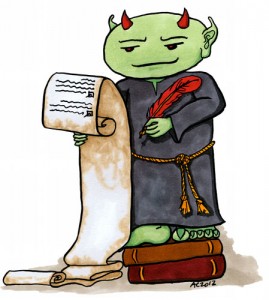In Optimizing Focus: 3 elements to consider, I outlined three elements that affect your focus during a writing session: the task itself, how you are feeling, and the context. I have written a series of follow up articles going into more detail about what that framework looks like in practice. I use the term “optimize” purposefully. Your goal is not to achieve some ideal state of focus that you can replicate every time you sit down. Your focus will vary based on the particular combination of task, feelings (physical & emotional), and context. Your goal is to optimize your focus for this session given what you are working with today. Links to other posts in the series are in the Optimizing Focus Spotlight.
Select the task you most want to work on.
You do not have to write in the order things will appear in the final manuscript. You can start anywhere. If you sit down at your desk today and you really want to write something about one bit of your data, go ahead. If you’ve got a bright idea for how you can fix that section that isn’t quite working, revise that section.
The important thing is that over time, you fill up all the sections of your article or book, revising them so they say what you want to say clearly, making sure there are smooth transitions, and that everything is referenced and formatted correctly.
If you really like to write an outline and make it increasingly more detailed then start with an outline. If the thought of writing an outline makes you recoil but you have a section you are excited to write about, then skip the outline for now. If you are having trouble figuring out what else the piece needs, maybe writing an outline would be a satisfying way to clarify the structure.
Similarly, as anyone who has ever driven in snow or mud will tell you, spinning your wheels will not get you unstuck. It may make things worse. If you get stuck, it is worth persisting for a bit to see if you can get unstuck. If your strategies are getting you more stuck, stop. You can still make good use of your writing time by switching to a different task that will be more enjoyable. You will be able to get that other section unstuck another day.
Your gremlins may not like it.

There is a very powerful cultural narrative suggesting that if you are enjoying something it isn’t really work. You probably have a gremlin that tells you that work isn’t supposed to be enjoyable and you just need to suck it up. That gremlin may also think there is an efficient way to write this thing, and enjoyment is definitely not the way to efficiency.
I would like to respectfully ask that gremlin to go get a cup of coffee with the gremlin who wonders why you have so much trouble staying focused on that task that you really dislike. They can spend the time looking up information on how to get a vehicle out of a snowdrift if they like, as long as they leave you alone.
If it helps convince the gremlins, Joss Whedon, a very successful screenwriter, uses this method. He points out that you can get most of the way to finished by sitting down regularly and writing what you want to write. When you are close enough to finished, you will want to do the tasks that are left because you want to be finished so you can move on to the next thing. (Read more here: How to be prolific: Guidelines for getting it done from Joss Whedon).
Academic writing is not so different from other kinds of writing that you can’t at least give this a try.
Don’t be fooled by the transition.
You may find that some writing tasks are quite enjoyable once you are immersed in doing them, but they are difficult to get into. I used to play rugby. I really enjoyed it. But when you are sitting in your warm living room, the thought of putting on shorts to go run around on a muddy field on a cold day is not that attractive. Similarly, I am often not that keen on getting ready to go out to a concert or a party even when I know I’ll enjoy it once I’m there. You can probably think of similar things in your own life.
Writing can be like that. Transitions are awful almost all of the time. Even transitioning into something you love doing is nowhere near as fun as doing it. Observing your own writing will help you optimize your focus. Knowing that once you are in it, you really do enjoy a particular task but it typically takes you X minutes to get there is important information. It helps you know if the amount of time you have available today is enough for you to enjoy this task. It helps get you through the X minutes of transition when it is.
If you enjoy it, it’ll be easier to find time for it.
The bonus of this method is that overall you will enjoy your writing more. It will still be difficult to articulate what you want to say. You will still have days when you wonder if you have anything worth saying or if anyone will care. Some parts of the process will still be tedious, but you will enjoy writing much more of the time. It is always easier to find time to do things that you enjoy doing.
Related posts:
Optimizing Focus: 3 elements to consider
Doing what you want to do an earlier piece on this same idea
An earlier version of this post was sent to my newsletter on 12 October 2018. Edited September 2021.








